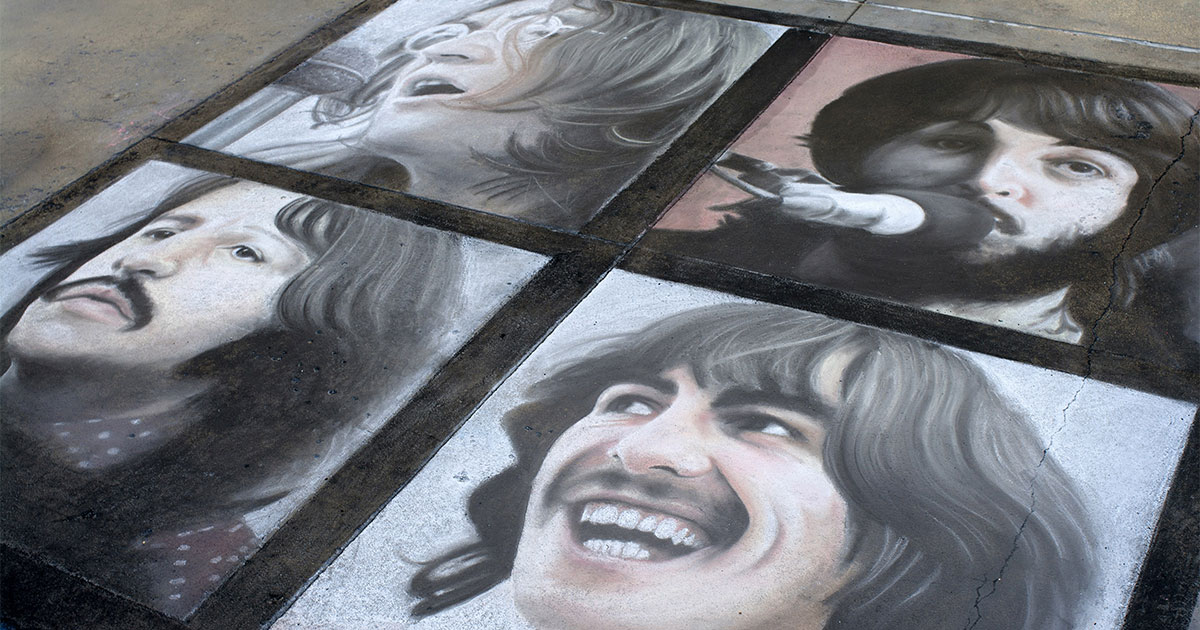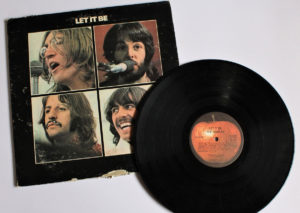What the Beatles Can Teach Us About Creativity and Collaboration

Kevin Sweeney still remembers the music teacher in junior high who taught him about the Beatles. This was in the mid- to late 1970s, and the teacher was enamored with the Beatles’ creativity and how they were so willing to take their songs in new and unlikely directions.
The group left an impression on Sweeney. “It was a moment of awakening,” says the adjunct lecturer of entrepreneurship at Babson College. “Here I am, 40 some years later, I am still excited about them.”
He’s not the only one. Late last year, Disney released The Beatles: Get Back, a nearly eight-hour documentary that follows the band at work on what was to be the last album they released, Let It Be. Critics and fans pored over the film, which offers an intimate look at the relationships between John, Paul, George, and Ringo, and how they worked together to make music.
“It is a rich, rich documentary,” says William Gartner, Babson’s Bertarelli Foundation Distinguished Professor of Family Entrepreneurship. “There are a lot of things going on.”
After watching the in-depth documentary, Gartner and Sweeney offered five key takeaways about what the group can teach us about collaboration, the entrepreneurial spirit, and the creative process.
Accept that Creativity Is a Process
One of the biggest joys of watching the documentary is seeing the Beatles hash out their songs. In one jaw-dropping scene, Paul McCartney is strumming his bass guitar and, in mere moments, appears to conjure up the group’s next hit single, “Get Back.”
Most songwriting scenes in the film, however, aren’t so instantaneous and magical. If anything, they are repetitive and ordinary. The Beatles show up in the studio in the morning just like anyone else beginning their day at work. They drink lots of tea and endlessly hammer away on songs, making tweaks as they play them over and over.

The Beatles may have written many great songs in their career, but the documentary makes one appreciate all the laborious effort it took to do that. “It taps into a lot of issues about how creativity really happens,” Gartner says. “There is this whole iterative process. A lot of it is boring. You just got to put the time in.”
Many songs are tinkered with in the documentary. Not all of them are brilliant. “They do a lot of stuff,” Gartner says. “Some of it works, and some doesn’t. It’s not like everything is a gem.” The trick, as in any creative endeavor, is to keep at it until the gems eventually do appear and can be polished.
Take a Break
While the Beatles were incredibly disciplined and committed in their work, they weren’t above moments of levity. They clown around or even burst into silly songs.
“Humor was their saving grace,” Sweeney says. “They remembered not to take themselves too seriously.”
The group also frequently stepped away from whatever tune they were fiddling with to play some of the old rock ’n’ roll songs that inspired them when they were younger. Playing these old songs served not only to break up the monotony of their work but also ease some of the tension that was building in the studio, as the band was hurtling toward a breakup the following year.
“In long projects, there are moments when you need that break,” Sweeney says. “It allowed them to keep going without tension reappearing.”
Make Sure to Mentor
The documentary does have some tense moments, especially involving George Harrison, who was growing into his own as a songwriter but found that McCartney and John Lennon, the group’s main composers, weren’t always receptive to his input.
McCartney seems particularly overbearing at times in the film, which leaves hard feelings. Sweeney says this was a lost opportunity. The group had accomplished so much together, but McCartney had failed to recognize and support the growth of the person standing beside him.
“I’m never discouraged about the nature of things breaking up. To me, having the Beatles disband is not bad in and of itself. It’s an entrepreneurial story. It doesn’t mean there wasn’t more entrepreneurial activity spinning out of it.”
William Gartner, Babson’s Bertarelli Foundation Distinguished Professor of Family Entrepreneurship
“Paul is the most holistic musician,” Sweeney says. “He is so skilled at so many different things, but no one taught him how to be a mentor.”
Harrison, for his part, does serve as a mentor to Ringo Starr in the film, helping the drummer compose his song “Octopus’s Garden.” “George was actually a better mentor,” Sweeney says. “He wasn’t condescending. They sat down at the piano together. That was an amazing piece of great coaching. And Ringo, because he doesn’t have a huge ego, was just listening.”
Appreciate the Team Players
Speaking of Starr, Sweeney says that people often don’t recognize the important role he plays in the Beatles. Yes, he is often quiet and sitting in the background in the film, but Starr is a team player who is easy to work with and does whatever is required of him.
“They would have been a much less successful band without him. People don’t give him credit,” Sweeney says. “Ringo is the consummate professional. He works with whatever is in the room.”
His contributions to songs are subtle. “He’s not a showy drummer,” Sweeney says. “He is about listening to the music and finding how to complement it. He knows his role, and he does it really well.”
Another great team player seen in the movie is Billy Preston, a keyboardist who joined the sessions about halfway through and whose presence and talent elevated the proceedings.
“He was the perfect addition,” Sweeney says. “He fit in as part of the band. He added a lot without adding to the drama. He did a lot of listening.”
Embrace Change
As Harrison sings in one of his songs, “all things must pass,” and that is certainly true for the Beatles. Knowing that the group will soon break up can make the documentary bittersweet. “You can see the decomposition of the Beatles happening in real time,” Gartner says.
Still, Gartner doesn’t dwell on the breakup. “Nothing lasts forever,” he says. “I’m never discouraged about the nature of things breaking up. To me, having the Beatles disband is not bad in and of itself. It’s an entrepreneurial story. It doesn’t mean there wasn’t more entrepreneurial activity spinning out of it.”
For sure, the Beatles may have gone their separate ways, but they each continued to put out great music. They also dabbled in other activities. Lennon became more involved in social justice issues, for instance, and Harrison became a film producer.
Individually, they may have never scaled the heights that they did together, but Gartner says that’s OK. They were still productive and trying new things, and when any venture breaks up, that should be the measure of success for its former participants. “The Beatles broke up,” Gartner says, “but in their own ways they all succeeded.”
Posted in Insights






